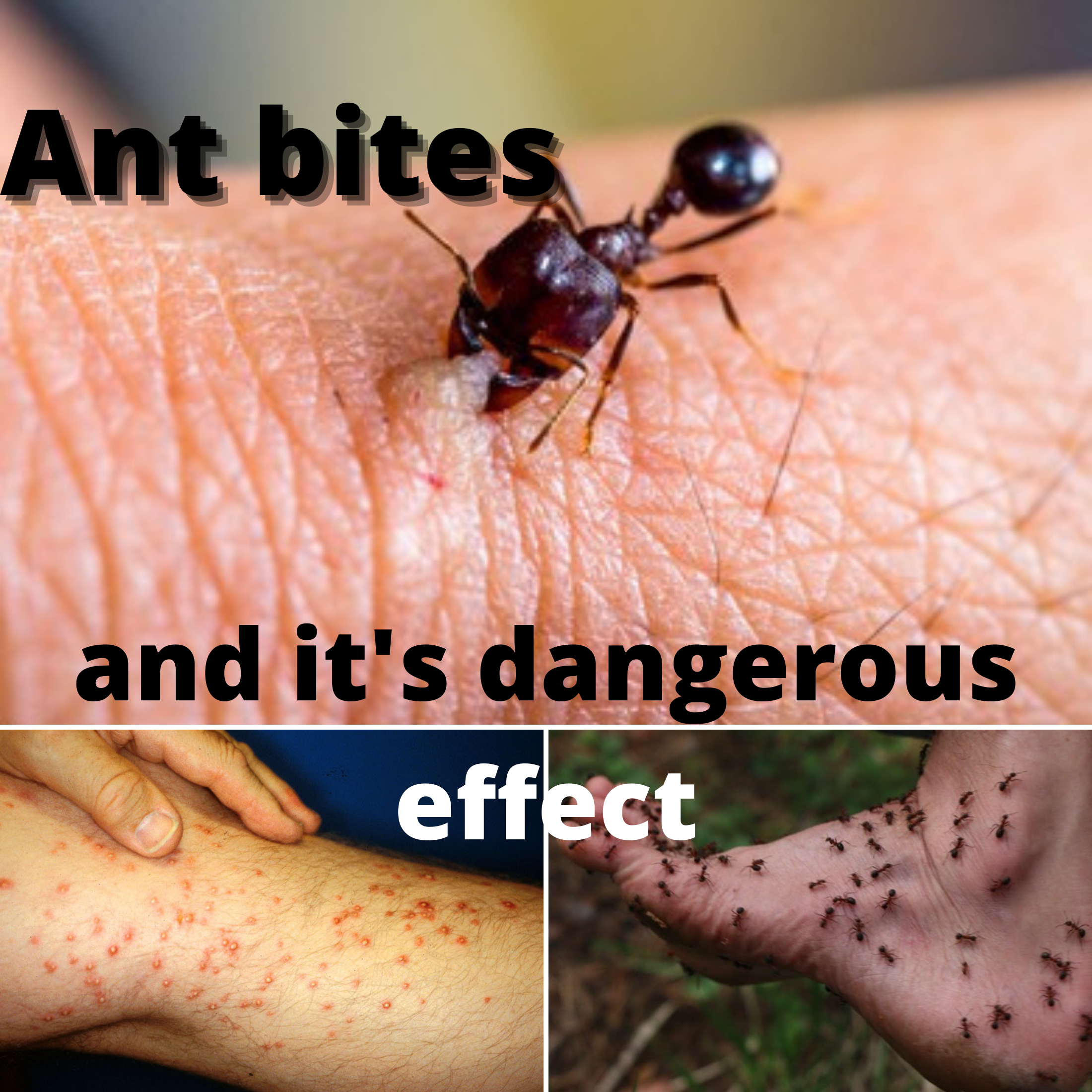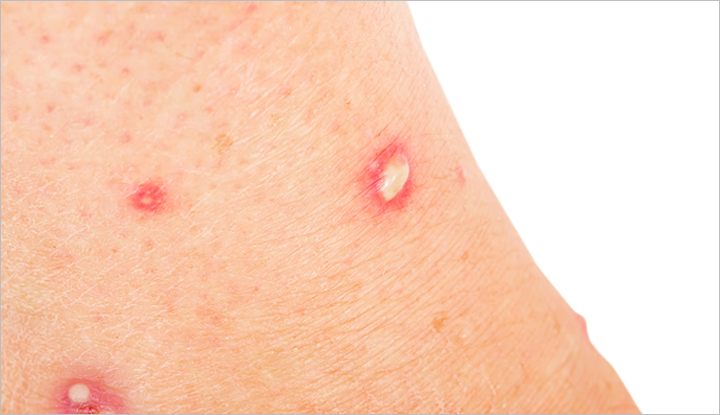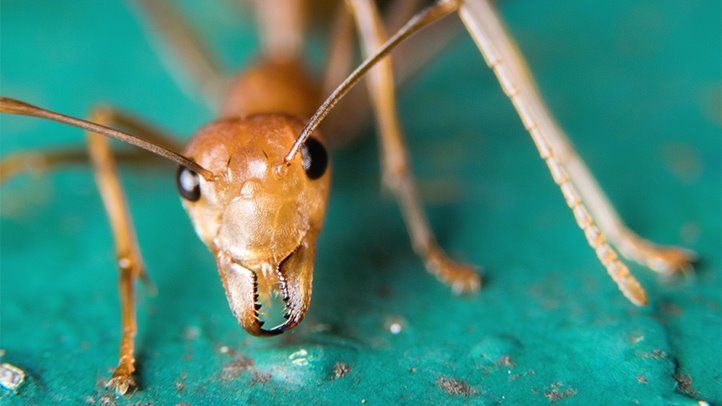Ant bites swell due to the body’s allergic reaction, releasing histamine to combat the ant’s injected formic acid or venom. Swelling is a common immune response.
Dealing with ant bites can be an uncomfortable experience, often marked by telltale swelling and itching. These minuscule insects pack a surprising punch with their bites or stings, triggering our immune system’s defenses. Our bodies respond to the foreign substances introduced by the ant’s assault, such as formic acid or venom, depending on the ant species.
This reaction typically involves releasing histamine, a compound in the body that causes inflammation and swelling at the site of the bite. As a natural defensive mechanism, this process aims to isolate and eliminate the irritant. While swelling from ant bites is mostly a minor inconvenience, it serves as a reminder of our intricate immune response at work even against the tiniest of adversaries.
The Anatomy Of An Ant Bite
Ant bites are a common nuisance. Understanding the anatomy of an ant bite can help explain the swelling. Read on to unravel the mysteries of ant bites.
Stinger And Venom Injection
Ants are equipped with a stinger used for defense. It is this part that injects venom into the skin. Here’s how it works:
- Point of Contact: An ant uses its stinger during an attack or defense.
- Injection: The sting drives venom from a gland within the ant into your skin.
This process is brief, but the effects can be felt long after the initial bite.
Chemicals That Cause Reactions
Ant venom consists of chemicals that trigger a reaction. Key players are:
- Histamines: They cause itching, redness, and swelling.
- Proteins and peptides: These can cause more intense pain and irritation.
Our bodies respond to these invaders by releasing histamine, which leads to inflammation and swelling.
Ant bites swell due to our immune system’s fight against these foreign substances. Often, the severity depends on the ant species and individual reactions.

Credit: www.imperialpestprevent.com
Immediate Skin Reactions
When an ant bites, your skin reacts instantly. This natural defense can cause noticeable discomfort. Let’s delve into why this happens and what your body is doing to protect itself.
Localized Pain And Redness
The first thing you might feel is a sharp sting or pain. This is your body’s alarm system, signaling that something is wrong. The area around the bite becomes red due to increased blood flow. This reaction helps healing agents in the blood reach the site of the bite more easily.
Swelling And Heat Formation
Your immune system responds by sending inflammatory cells to the site. This causes swelling, or a small bump, which is your body working to isolate the invader. You might also feel heat as the area becomes warm to touch. This warmth is another part of your body’s healing process.
- Pain alerts you to the bite.
- Redness is caused by blood rushing to the site.
- Swelling occurs as a protective barrier.
- Heat helps with the healing process.
Allergic Responses To Ant Venom
Ant bites might seem minor, but they can lead to serious allergic responses. Ant venom contains proteins and other substances that can trigger the immune system. Different people react differently. Some might experience a mild reaction. Others may suffer from severe allergies or even life-threatening conditions. What makes these reactions vary? Let’s break down the signs and potential risks.
Mild to Severe Allergic Reaction SignsMild To Severe Allergic Reaction Signs
The severity of allergic responses to ant venom can vary greatly. Here’s what to look for:
- Redness and Swelling: The most common signs.
- Itching: A persistent urge to scratch the bite area.
- Heat: The bite spot might feel especially warm.
- Hives: Red, itchy, and raised welts on the skin.
- Pain: From mild irritation to intense discomfort.
- Dizziness: Feeling lightheaded or faint can indicate a more serious reaction.
Anaphylaxis: A Deadly Risk
Anaphylaxis is the most severe allergic reaction. It is rare but deadly. It needs immediate medical attention. Understand the signs quickly.
| Signs of Anaphylaxis | |
|---|---|
| Difficulty Breathing | Airways can swell, causing breathing issues. |
| Drop in Blood Pressure | This might lead to shock, signaled by a rapid weak pulse. |
| Hives or Rash | Look for a sudden outbreak across the body. |
| Swelling of Face or Throat | Watch for puffy eyes or tongue, or swollen lips or throat. |
| Nausea or Vomiting | These are signs your body is fighting a toxic invader. |
If you spot these signs, seek emergency help immediately. Fast action can save lives.
Histamine: The Swelling Culprit
Histamine: The Swelling Culprit reveals a fascinating aspect of our body’s defense mechanism. Most people have felt the irritating itch and swelling caused by an ant bite. This swelling is a sign of our body’s immune response in action. Histamine, a compound released by our cells, plays a pivotal role in this process. Let’s delve into the science behind the swelling and understand how histamine operates when ants decide to bite.
Role Of Histamine In Immune Response
Our body’s immune system is always on guard, ready to defend against invaders. When an ant bites, it injects substances into our skin. Our body sees these substances as potential threats. Histamine steps onto the scene.
Specific cells called mast cells release histamine. It acts like a red flag, signaling the immune system to respond. This response aims to protect our body and repair any damage caused by the ant bite.
Here’s what histamine does:
- Widens blood vessels: This allows more immune cells to reach the bite site.
- Increases blood flow: This helps to transport immune cells and nutrients faster.
- Stimulates nerve endings: This causes the itch and pain, alerting you to the bite.
Histamine-induced Tissue Swelling
The widening of blood vessels, known as vasodilation, is a key player in swelling. Histamine makes the walls of blood vessels more permeable. This change allows fluid, proteins, and white blood cells to pass out of the blood vessels and into the surrounding tissue.
This fluid accumulation is what causes the area to swell. It’s a protective buffer that helps prevent the spread of any toxins. This swelling also brings more nutrients and immune cells to the area to speed up healing.
| Effects of Histamine on Tissue | |
|---|---|
| Vasodilation | Enlarged blood vessels for immune response |
| Permeability | Fluid leaks to tissue causing swelling |
| Nerve stimulation | Results in itchiness and pain |
Understanding histamine’s role helps to appreciate the body’s natural defenses and why an ant bite swells. It’s all part of a fascinating process designed to keep us safe and healthy.
Types Of Ants And Their Bites
It’s important to know that not all ants bite the same way. Some ants leave a small bump, while others can cause big swelling or even more serious reactions. We should talk about each kind of ant and how they bite. This helps us understand why they swell and how to deal with them.
Fire Ants: A Common Aggressor
Fire ants are well-known for their aggressive behavior and painful bites. When they bite, they inject a toxin that can cause swelling, redness, and burning pain. A single fire ant can actually sting multiple times. The bites might even turn into blisters. Here’s what you need to know about fire ant bites:
- Solitary Fire Ant: This ant’s bite can itch and hurt.
- Multiple Fire Ant Bites: They can create a series of red spots that swell.
- Swelling: Often, the bites swell up because of the venom.
- Reaction Time: Swelling can occur quickly and last for days.
Harvester Ant Bites: Less Common, But Potent
Although harvester ants are not as commonly encountered, their bites are quite powerful. They have strong jaws and when they bite, they release a sting that can cause significant pain and swelling. Some key points about harvester ant bites include:
- Pain Scale: Harvester ant bites are more painful than other ants.
- Swelling and Redness: Their bites can cause swelling and irritation.
- Duration: The effects of the bite may last longer compared to others.
- Toxin: They inject a toxin that can cause allergic reactions in some people.
Preventing Ant Bites
Stings from ants can cause swelling. The swelling is your body’s reaction. Your body is fighting the ant’s venom.
Stay away from ant habitats to prevent bites. Doing so keeps you and the ants safe.
Avoidance Strategies
- Know your area. If ants live there, be careful.
- Watch your step. Avoid ant paths and nests.
- Clear food waste. Ants seek food. No scraps, no ants.
- Use natural repellents. Cinnamon and vinegar deter ants.
Protective Measures
Dress to guard your skin. Long sleeves and pants help. Tuck your pants into your socks.
| Protective Measure | How It Helps |
|---|---|
| Bug spray | Repels ants |
| Barrier creams | Forms a shield |
| Sealed shoes | Keeps feet safe |
First Aid For Ant Bites
Ant bites can quickly turn a pleasant outdoor moment into an uncomfortable experience. Finding the right first aid for ant bites is essential for reducing the pain and avoiding further complications. A timely response can make all the difference.
Immediate Actions
When an ant bites, act quickly with these steps:
- Wash the bite area with soap and water to prevent infection.
- Apply a cold compress or ice wrapped in cloth to reduce swelling.
- Elevate the affected limb to minimize inflammation.
- Avoid scratching to prevent skin breakage or scars.
Home Remedies For Relief
Several home treatments can provide comfort:
| Home Remedy | Instructions |
|---|---|
| Baking Soda Paste | Mix with water, apply to bite, let dry, rinse off. |
| Aloe Vera | Apply gel to soothe skin and reduce itchiness. |
| Honey | Dab a small amount for its antiseptic benefits. |
| Lemon Juice | Apply to neutralize venom and lessen irritation. |
Engage in these simple steps and home remedies to ensure a quick recovery from ant bites and return to enjoying the great outdoors.

Credit: paidepo.com
When To Seek Medical Attention
Experiencing an ant bite can be a simple annoyance for many, but sometimes it can lead to swelling and unexpected complications. It’s crucial to recognize when these bites escalate from mere irritations to medical concerns. Knowing when to seek professional help can prevent further health risks associated with severe allergic reactions or infections.
Symptoms That Warrant A Doctor’s Visit
Bites can sometimes cause more than just a red bump. Look out for these symptoms:
- Difficulty breathing: Airway swelling needs immediate attention.
- Rapid swelling: If swelling spreads quickly, it’s a red flag.
- Intense pain: Severe pain around the bite may indicate infection.
- Dizziness: Feeling faint or dizzy could suggest a systemic allergic reaction.
- Nausea or vomiting: When accompanied by a bite, these symptoms are concerning.
- Fever: A high temperature can signal infection.
- Red streaks: Visible signs of infection from the bite site.
If any of these symptoms occur, seek medical attention immediately. These signs can indicate severe allergic reactions or infections that require a doctor’s care.
Treatment Options For Severe Reactions
For severe ant bite reactions, a variety of treatments are available:
| Treatment | Description | When to Use |
|---|---|---|
| Antihistamines | Medications to reduce allergic symptoms | For itching and swelling |
| Corticosteroids | Anti-inflammatory drugs to decrease swelling | For significant swelling and pain |
| Epinephrine | Emergency treatment for anaphylaxis | For life-threatening reactions |
| Antibiotics | Treats bacterial infections | If infection is present |
Remember, it is essential to follow medical advice and get proper treatment if you experience serious symptoms from an ant bite.
Long-term Consequences Of Ant Bites
Although ant bites may seem small and insignificant, they can lead to long-lasting effects. It’s not just about the immediate pain and swelling but also the potential for more serious implications down the road.
Scarring Potential
Ant bites can sometimes result in scars, especially when they are scratched or not treated properly. The skin might heal with a discoloration or a permanent mark, depending on the body’s response and the intensity of the bite. To lessen scarring risks:
- Do not scratch the bite area
- Use antiseptic creams and proper wound care
- Seek professional help if the bite looks infected or serious
Sensitization To Future Bites
With repeated exposure, some people might develop a sensitivity to ant venom. This means the body reacts more aggressively each time it encounters similar venom. Increased sensitivity can cause symptoms like:
- More severe swelling
- Intense itching or hives
- Increased risk of allergic reactions
If symptoms worsen with subsequent bites, consult a doctor. A specialist can provide treatments like antihistamines or epinephrine for severe reactions.

Credit: my.clevelandclinic.org
Frequently Asked Questions Of Why Do Ant Bites Swell
What Causes Ant Bite Swelling?
Ant bites swell due to the insect’s venom, which triggers an immune response. Serotonin and histamine within the venom cause increased blood flow and white blood cell activity to the affected area, leading to inflammation and swelling.
How To Reduce Swelling From Ant Bites?
To reduce swelling, apply a cold compress to the area. This helps to slow blood flow, reducing inflammation. Over-the-counter antihistamines or hydrocortisone cream can also alleviate itching and swelling.
Are Ant Bites Dangerous?
Most ant bites are not dangerous and cause minor symptoms like swelling and redness. However, some individuals may have allergic reactions that require medical attention. Fire ant stings can be more severe and might need treatment.
Can Ant Bites Cause An Allergic Reaction?
Yes, ant bites can cause allergic reactions in some people. Symptoms include excessive swelling, redness, rash, or difficulty breathing. If an allergic reaction is suspected, seek medical attention immediately.
Conclusion
Ant bites can cause swelling due to our immune response to the formic acid and other irritants. Understanding this natural reaction helps us manage symptoms effectively. Remember, simple care techniques can alleviate discomfort significantly. Stay vigilant about ant encounters, and your outdoor experiences will be safer and more enjoyable.

I’m MD Tanvir, and I bring years of expertise gained from working closely with pest control companies to the forefront. My journey in the industry has inspired me to launch Bug Battler, a platform aimed at equipping people with the know-how to combat pests autonomously. Through Bug Battler, I aim to empower individuals with practical insights to tackle pest infestations effectively.

